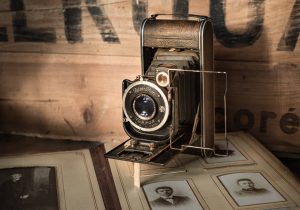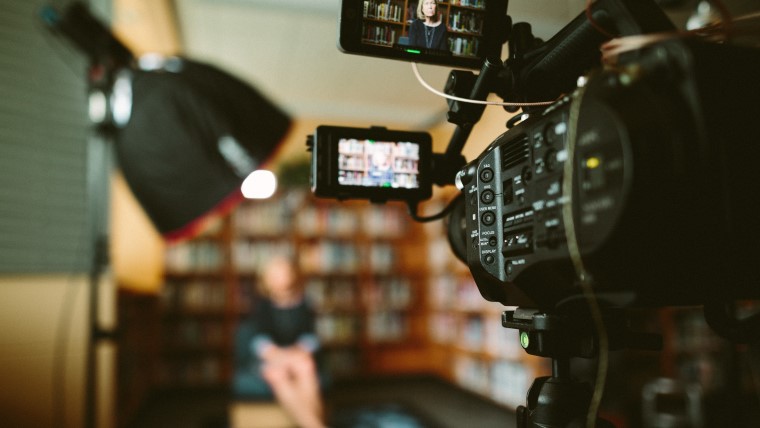Today we are excited to feature a case study from Dominic, who works in the video production and filmmaking industry. Read on to find out about Dominic’s career journey from a MA in History, to working in filmmaking and video production – with some helpful tips (and a work experience programme) for students interested in creative careers along the way!
Tell us about yourself!
My name is Dominic Sutherland. I run NextShoot, a corporate video production company in London. My journey towards corporate video didn’t start with any vocational study (I have an MA in History). However, I always knew that I wanted a career in the Media, and whilst at school and later at university I secured work experience in journalism and advertising which helped me work out what my future dream job could be. By the time I’d finished my degree, I knew that I wanted to make history documentaries.
I realised there wouldn’t be a straight line towards my ideal job, so I took an entry-level job on a live sports show. After a few months, I had the opportunity to apply for a research role on a science documentary series for an independent production company. After working in this role for a while, I was able to transition to historical documentary projects and was lucky enough to get a freelance position in the BBC History Unit. I later became BBC staff while working on a landmark series about the Holocaust (Auschwitz, the Nazis & the ‘Final Solution’). In 2008 I left the BBC to set up a corporate video production company, NextShoot.
How has video production evolved over your career?
One of the reasons I felt it was possible to set up a corporate production company in 2008 was that there had already been a significant shift in the quality (better) and cost (cheaper) of filming and editing equipment. Video began to take off and that trajectory has continued exponentially. Today the two key focus points in the industry are video quality and the measurability of its success.
What I think the pandemic has changed directly is that video is being used to communicate ideas that might have been made previously in a face-to-face meeting, at an event or an exhibition. No doubt videos will continue to be used in this way beyond the pandemic. More indirectly, this period of isolation has led to reflections on wider societal issues – in particular around diversity, conscious and unconscious racism, and sustainability – that we are seeing reflected in all messaging from businesses, including video.
The King’s Careers Take: Interested in a career in film & video production? Check out our industry guide on KEATS and discover the many ways you can develop your skills and take your first steps towards a career in the field.
What role does diversity play in video content creation today?
Diversity (gender, race, ethnicity, sexual orientation, age) has become a very important topic for all brands and organisations to engage with. In terms of the production of video content, I suspect diversity – in particular around gender and ethnicity – still has some way to go. There are not enough people with BAME heritage in production and there are few female technicians (camera operators, sound recordists etc), which probably has its roots back in the issues that concern girls learning STEM subjects.
Of course, diversity has a massive part to play in content creation. Not only do companies benefit from a diverse workforce, but in the business of communication, the representation of ideas that are founded on diverse experiences is of paramount importance when speaking with a diverse society.
What advice would you give to students who are thinking about working in film and video production?
There’s a tendency for graduates to position themselves as able to do a number of different roles – cinematographer, editor and photographer, for example. I feel that it’s still best to present yourself as a specialist in one field and to mention your complimentary skills elsewhere in your CV.
Above all, whether you’ve found work or not, don’t stop practising your craft. Access to equipment might be your main hurdle, but don’t stop making work, even if it means making content filmed on a phone camera. Not only does this process sharpen your skills, but it sends out a clear message to potential employers about your commitment and passion.
The Nextshoot work experience programme
At NextShoot we’re big believers in the importance of internships/ work experience. We’re aware it’s the best way for undergraduates to get a feel for what they might do, or want to avoid, with their career. NextShoot runs a work experience programme with a number of placement opportunities. This has been disrupted this Summer by COVID-19, but we hope to be able to offer placements from March-April 2021. The programme has supported a number of female technicians to date and we are keen to encourage applications from BAME candidates.
The King’s Careers Take: As Dominic says, work experience, shadowing and internships are great ways to help you try your chosen career paths out in practice. Wherever you are on your career journey (discovery, focusing your options or taking action), King’s Careers & Employability offer help and support for you to find opportunities. Visit King’s Internships to find out more!

